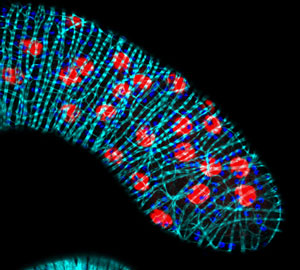Research Quick Pics
Whether it’s saliva, insulin, or sweat, we rely on our secretions. It matters that just the right amounts of just the right proteins go where they should. Secretory failures lead to diseases, including dry mouth disorders.
To uncover the intricacies of protein secretion, NIDCR’s Kelly Ten Hagen, PhD, and her lab study different types of fruit fly glands (like the one shown here) and the cellular packets known as secretory granules (red) that store proteins destined for secretion. The scientists discovered that secretory granule formation in several of the fly’s glands depends on a protein receptor called Tango1.
Using new, high-resolution visualization techniques on fly salivary glands allowed the researchers to observe that Tango1 helps form a passageway between cell compartments, through which proteins are shuttled for packaging into secretory granules.
According to Ten Hagen, this mechanism may be key to protein secretion across many types of tissues and could shed light on the basic biology of secretory glands in humans. The findings build on knowledge that could ultimately point to treatment targets for salivary gland disorders and other conditions involving defective secretion.
Related Link
Reference
Tango1 coordinates the formation of endoplasmic reticulum/Golgi docking sites to mediate secretory granule formation. Reynolds HM, Zhang L, Tran DT, Ten Hagen KG. J Biol Chem. 2019 Dec 20;294(51):19498-19510. doi: 10.1074/jbc.RA119.011063. Epub 2019 Nov 5.
NIH Support: In addition to being supported by NIDCR, this study also used the computational resources of the NIH High-Performing Computation Biowulf cluster.
Attention Editors
Reprint this article in your own publication or post to your website. NIDCR News articles are not copyrighted. Please acknowledge NIH's National Institute of Dental and Craniofacial Research as the source.
Subscribe to NIDCR Science News
Receive monthly email updates about NIDCR-supported research advance by subscribing to NIDCR Science News.


